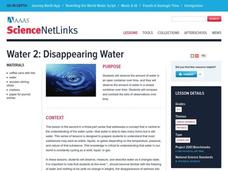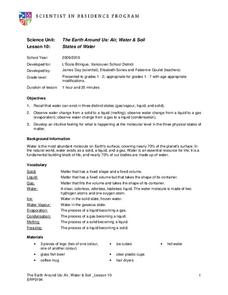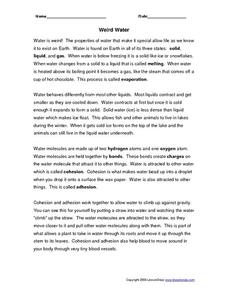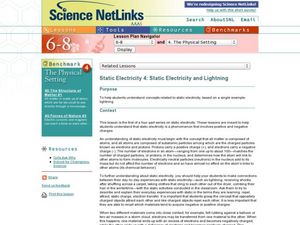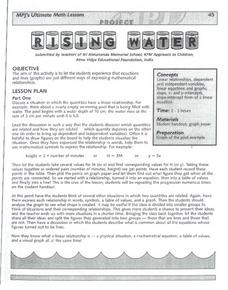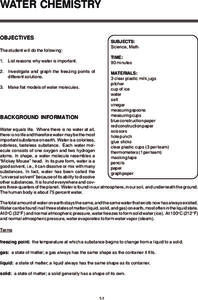Curated OER
Disappearing Water
Young scholars explore the water cycle. For this earth science lesson, students observe and measure water in a closed container and in an open container. Young scholars record their observations and compare their sets of data to draw...
Curated OER
States of Water
Students investigate the 3 states of matter. In this physical science "matter" instructional activity, students observe and participate in a number of demonstrations involving melting and freezing water. Students observe the effect heat...
Curated OER
Water Cycle Stories
Students create water cycle stories. In this water cycle lesson plan, students review the parts of the water cycle. They create a story that describes the journey of a water molecule as it makes its way through the cycle and into...
Scholastic
What Are Clouds Made Of?
Tiny bubbles, in my...clouds? Offer youngsters a hands-on, visual learning experience when reviewing the scientific concepts of condensation, water vapor, and the collection of droplets that make up clouds.
Curated OER
Weird Water
For this weird water worksheet, students read for information and assess comprehension. In this true and false, fill in the blank, and multiple choice worksheet, students answer ten questions.
Curated OER
Matter and Molecular Motion
Fourth graders define the states of matter and their properties. They demonstrate the air is matter and observe the effect of molecular motion through these activities.
Curated OER
Physical and Chemical Properties of Matter
Learners identify the physical and chemical properties of matter. They review the types of matter. Students list the four states of matter (Solid, Liquid, Gas and Plasma). They recognize and describe the different types of matter.
Curated OER
Three States of Matter
Third graders investigate the three states of matter and the properties of materials as they undergo physical changes. They identify examples of each type of matter, role-play atoms in solids, liquids, and gases, and conduct an...
Curated OER
The Physical Behavior of Matter
Learners distinguish between three phases of matter: solid, liquid and gas, on the molecular level. They compare and predict the relative compressibility of the three phases of matter through journal writings and drawings.
Curated OER
Amazing Water Changes
Learners explore the properties of water and how it changes states. In this kindergarten to 2nd grade science lesson plan, students pair a hands-on science activity with two suggested books. This inquiry lesson plan...
American Chemical Society
Heat, Temperature, and Conduction
How does heat move from one item to another, even when the items are in different states of matter? Pupils experiment with adding washers to hot water and adding hot washers to room temperature water to observe the heat transfer.
American Chemical Society
Temperature Affects Density
Different substances can have different densities, but can the same substance have different densities? Lesson explores the effect of temperature on the density of water. Extension idea connects the concept of how melting ice in lakes...
American Chemical Society
Changing State: Evaporation
Why do experiments require a control? Guide scholars through designing an experiment to see what they can do to evaporate water faster with a lesson that stresses the importance of controlling all variables. The second activity...
American Chemical Society
Changing State: Condensation
When you have a cold drink and you notice the water forming on the outside, it is literally pulling the water from the surrounding air to form the condensation. After watching a demonstration of condensation forming on a glass,...
Curated OER
What is Air?
Students investigate air by participating in a class experiment. For this matter measurement lesson, students identify air as a gas which consists of mass. Students utilize a windsock or balloon to measure oxygen and explore it's true...
Curated OER
Heat and Matter
Students explore liquids and solids by conducting in class experiments. In this matter lesson, students define the properties of matter and how heat can change those properties. Students experiment with heating objects such as butter and...
Curated OER
Building Blocks of Matter
Middle schoolers view videos and worksheets and construct a model of a water molecule. In this atomic structure lesson, students view video clips and handouts about matter and nanoscience. They construct a model of a water molecule with...
Curated OER
Molecules on the move
In this molecules learning exercise, students add food coloring to water and heat it up and answer questions about their findings. Students answer 4 questions about heating molecules.
Curated OER
Changing States of Matter - Making Ice Cream
Students make ice cream as a result of viewing changes of states of matter. In this matter lesson plan, students learn how heating and cooling can effect a state of matter to change.
Curated OER
Rising Water!
Students observe water change from a liquid to a gas state when heated and then return to its liquid stage when cooled. They learn that gas molecules move faster than liquid molecules. They discover physical properties that describe how...
Curated OER
The Water Cycle/States of Matter
Students engage in a lesson that is concerned with the water cycle and different states of matter. They conduct research using a variety of resources in preparation for taking a quiz. Then students take the quiz in correlation to having...
Curated OER
States of Matter
Students study the vocabulary of the states of matter. In this states of matter vocabulary lesson, students investigate and study the meaning of the words solid, liquid, and gas. They experience demonstration lessons that give them...
Curated OER
WATER CHEMISTRY
Students list reasons why water is important and investigate and graph the freezing points of different solutions.
Curated OER
States of Matter
In this states of matter worksheet, students read a 2 page article on the 5 states of matter, answer statements with multiple choice answers, fill in 4 fill in the blank statements and 3 true or false statements about the 5 states of...


